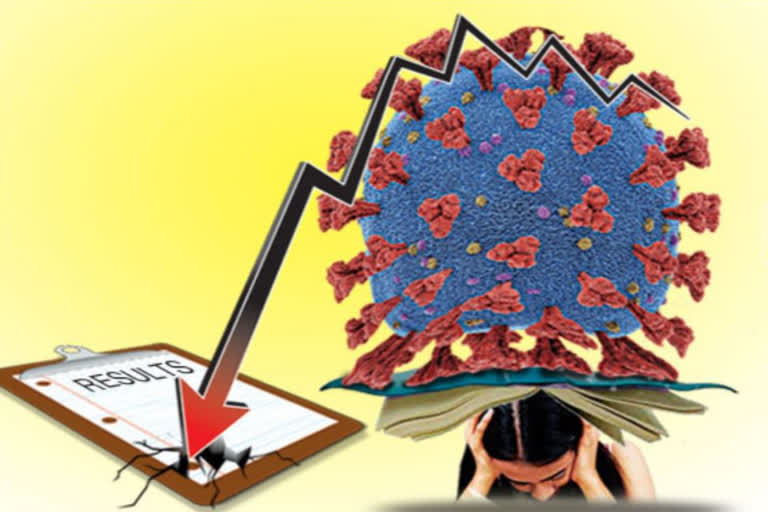Hyderabad: Owing to the pandemic, digital education remains a distant dream for the underprivileged as many students are lagging behind due to a lack of smartphones. The circumstances brought about by the pandemic have severely affected students enrolled in government schools. The Covid-19 crisis has damaged the prospects of the school-going kids and their future as well, say experts.
A study of the recent Class 11 results revealed how Covid-19 has deepened inequalities among students of private and government schools.
Despite the state government opting to pass all failed candidates of Class 11, education experts opined that these results point to a much bigger crisis. ETV's correspondent spoke with students and lecturers of government colleges in Jayashankar Bhupalapally, Hanumakonda, and Sangareddy districts and the facts were a bit shocking.
The educational standards of underprivileged students are falling at an alarming level. Students of government schools have been cut off from colleges and schools for over a year. Lecturers pointed out that the students enrolled in Class 11 lacked a basic understanding of subjects. They are apprehensive that these students would not perform well in engineering and medical entrance examinations.
Some families could not provide electronic gadgets for digital classes to ensure smooth education for their children. Hence, countless students are sitting on the brink of the educational crisis for being in the lower-income strata, added experts.
Also Read: Digital initiatives taken in education during pandemic will be strengthened, institutionalised: MoE
Parents in rural areas are unwilling to spend extra money on purchasing smartphones. This, for girls in the family, will mean the inability to attend online classes. A teacher from Sangareddy district said that "many parents of girl children refrain from buying smartphones as they are scared of misuse of the phone. Despite several efforts to make them understand the importance of digital education but they had been adamant about their decision."
At present, there are 23 students enrolled in Class 12 at Government Girls Junior College in Jogipeta, Sangareddy district. During the last year, 13 students out of 23 have got married. Out of that, only 8 of them appeared for examinations but failed to get minimum scores. Only 3 students from this college have been able to pass the examination.
In earlier days, the college used to record a passing percentage of 60 to 75, but the situation has worsened due to the pandemic. Talking to students currently enrolled in Class 11, it was found that only 5 students are attending classes but that too on an irregular basis.
Whereas, students studying at a corporate residential college in the city appeared for Class 11 exams by attending all classes. Despite colleges charging a whopping annual fee of Rs 1.2 to 1.4 lakh depending on the batch by offering fully air-conditioned classrooms and dormitories since their parents didn't mind spending big. Hence, out of 1,000 students, 920 passed the exams.
Also Read: Basic Education Council officers should adopt one school each, says UP CM
Corrective measures necessary
Retired principal MV Gona Reddy suggesting a course correction, said, "The government schools should provide special training for such students as a corrective measure. The government should reserve a few engineering and medical college seats for poor students. Without any measures, these college seats would go to urban and privileged groups who have all the required facilities. Whereas, poor students will face a lot of difficulties."
For instance, Kolluri Varun is a resident of Challagarige village, whose father worked as a watchman in Hyderabad. Varun stayed with his grandparents and attended a local Zilla Parishad High School. Varun studied at Hanumakonda Government Junior College for class 11. After the government had announced lockdown, he missed online classes for a year. As a result, he failed in class 11.
With no scope of attending online classes, coming into severe depression he died by suicide. Varun's teacher said, "the damage to Varun’s education had become irreversible as he failed in all the subjects in Class11. In a state of depression, he killed himself. Varun was an intelligent student, and he aspired to join the Indian Armed Forces. Lockdown and lack of smartphone cost his life and shattered his dreams."
The depression faced by these youngsters is unfathomable. The rate of death by suicide has increased since the pandemic began. Loss of education, loss of social life due to the missing peer groups in school has taken a toll on mental health, said a teacher.
The rural areas faced the maximum brunt of it. When they are struggling for food themselves and with the panic-stricken virus spreading rapidly providing digital education to their children is merely a flight of fancy. The government school children lacked all the required facilities for proper digital education. Without corrective measures, education for these underprivileged would go for a much bigger crisis, said another teacher.




